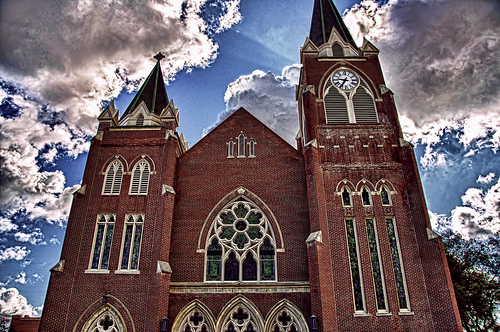We run our website the way we wished the whole internet worked: we provide high quality original content with no ads. We are funded solely by your direct support. Please consider supporting this project.
What Kind of Sinners Feel Welcomed by Your Church?
Perhaps the greatest indictment on evangelical churches today is that they are not generally known as refuge houses for sinners—places where hurting, wounded, sinful people can run and find love that does not question, an understanding that does not judge, and an acceptance that knows no conditions.
To be sure, evangelical churches are usually refuge houses for certain kinds of sinners—the loveless, the self-righteous, those apathetic toward the poor and unconcerned with issues of justice and race, the greedy, the gluttonous, and so on. People guilty of these sins usually feel little discomfort among us. But evangelical churches are not usually safe places for other kinds of sinners—those whose sins, ironically, tend to be much less frequently mentioned in the Bible than the religiously sanctioned sins.
It is rare indeed that a drunkard, drug addict, or prostitute would think of going to church because he or she just needed to feel loved and accepted. These people may go to bars, fellow addicts, drug dealers, or pimps to find refuge and acceptance, but they would not go to a church. In fact, as with the Pharisees in Jesus’ day, the church has generally represented everything people with these kinds of sins want to avoid at all costs. It has most often represented nothing but condemnation for these people. Indeed, churches frequently cultivate a reputation for “cracking down” on sins that fall into their “unsanctioned sin” category. To fail to do this, many have assumed, is to compromise our reputation for being set apart for holiness.
The sins we declare ourselves to be against are invariably selected to not target ourselves. If we were consistent in cracking down equally on all sins, we’d be cracking down on ourselves more than on those outside the church. And if we retained a system of evaluating sin at all, sins such as impatience, unkindness, rudeness, and self-righteousness—all indications that love is absent (1 Cor 13:4-5)—as well as prevalent “church” sins such as gossip, greed, and apathy would rank higher on our list than sins such as homosexuality or heterosexual promiscuity.
Striving for a holy reputation is also self-serving because the whole enterprise is unconsciously designed as a strategy for getting life for ourselves. Though it is mostly unconscious—indeed, though we uniformly deny it—we are feeding ourselves with our devised sin lists. We feel righteous and secure that we are “in” while others are “out” as we compare ourselves favorably with others who don’t measure up (according to our own biased measuring devise).
Above all else, love is that for which the church is called to be known. Sadly, in the name of acquiring for ourselves a reputation of holiness, we have often compromised the one reputation God calls us to have. Jesus was willing to forsake any possibility of having a holy reputation for the sake of loving those who were unholy.
To be sure, Christians are called to be a holy people, set apart by their good works. This is what transforming love looks like as it takes hold of people. But this is not a reputation we should seek to acquire or protect. The one reputation we are called to acquire is identical to the one reality we are called to live in: We are to be, and to be known as, a people who receive and give love in an outrageous, impartial, unconditional way.
—Adapted from Repenting of Religion, 102-104.
Category: General
Tags: Church, Homosexuality, Judgment, Kingdom Living, Repenting of Religion, Sin, Sinners
Related Reading

Greg Shares His Journey and Some Challenges Ahead
http://youtu.be/YdZKPG20kmQ Last September, Greg was asked to give the opening address at the Missio Alliance event Church & Post-Christian Culture: Christian Witness in the Way of Jesus. You can find more information here. Special thanks to our very own Stephen Konsor for his role in filming and editing this and other sessions. Enjoy!

The Purpose of the Church
Concerning the preaching of the Gospel, Paul wrote that God’s intent was that “through the church the wisdom of God in its rich variety might now be made known to the rulers and authorities in the heavenly places … in accordance with the eternal purpose that he has carried out in Christ Jesus our Lord”…

The Kind of Sin Jesus Publicly Exposes
Image by danny.hammontree via Flickr Religious sin is the only sin Jesus publicly confronted. The religious variety of the forbidden fruit is the most addictive and deceptive variety. Instead of acknowledging that judging others is prohibited, religious idolatry embraces the knowledge of good and evil as divinely sanctioned and mandated. It gives the illusion of being on…

Revolting Against Classism
All fallen societies and religions have a tendency to rank people according to class. All have ways of separating the insiders from the outsiders, the holy from the unholy and the more important people from the less important people. Jesus revolted against classism by the way he lived, a way defined by the Kingdom. Now,…

True Life Now
Whether we want to admit it or not, experience teaches us that life is a perpetual, relentless process of decay, one that we know inevitably leads toward death. And this fills many of us with a certain amount of angst. Some try to relieve their dread by immersing themselves in mind-numbing entertainment or chemical substances.…

Be the Change Now
Ghandi once said, “Be the change you want to see in the world.” It’s a profoundly Kingdom teaching. It seems to me, however, that few people adopt Ghandi’s philosophy. It’s far easier to focus our attention on how others should change. It’s far easier to spend our energy assigning blame for the problems of society…

